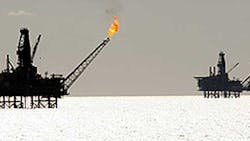Azerbaijan President Blames BP for Oil Production Shortfalls
Azerbaijani President Ilham Aliyev has sharply criticized oil company BP (IW 1000/4) for what he called "grave errors" that caused a decline in output from several Caspian Sea oil fields and cost the country $8.1 billion, state television said Thursday.
"This unexpected decline was only possible because of grave errors by BP, which leads the consortium that operates the Azeri and Chirag fields," Aliyev told a meeting of Azerbaijan's cabinet late Wednesday.
"Azerbaijan lost out on $8.1 billion in revenues" over several years because of the lower than expected output, he alleged.
Aliyev accused the British oil giant of not fulfilling its promises about output levels and said "serious measures" must be taken to rectify the situation.
Unacceptable Efforts
"Inaccurate forecasts are unacceptable to us. False pledges given to [Azerbaijan's] state oil company are unacceptable," he said in the comments to his cabinet that were televised on Thursday.
BP-Azerbaijan said it was working to resolve any problems.
"The company is fully loyal to Azerbaijan and is working with the State Oil Company of Azerbaijan (SOCAR) to address issues of production in the Azeri-Chirag-Guneshli fields in the shortest possible time," BP-Azerbaijan said in a statement Thursday.
BP has considerable assets in ex-Soviet Azerbaijan, including stakes in the Azeri-Chirag-Guneshli offshore oil fields and the huge Shah Deniz offshore gas field.
It also part-owns and operates the strategic Baku-Tbilisi-Ceyhan pipeline, the main export route for Azerbaijani oil.
Criticism Reflects Oil's Importance
Analysts suggested that Aliyev made such unprecedentedly harsh public criticism of BP because of oil's crucial importance to the country's energy-dependent economy.
"The role of BP in Azerbaijan's economy is so large that if 1% of BP's production falls, then it significantly affects both Azerbaijan's GDP as well as the country's exports and revenues," Ilham Shaban, director of the Center for Oil Research in Baku, told AFP.
Shaban suggested that Azerbaijan could take a tougher position in future relations with BP and threaten financial sanctions if its expectations are not fulfilled.
"There is such an international practice, for instance in Russia and Kazakhstan, to impose economic penalties," he said.
Kazakhstan notably renegotiated the contract with its Western partners exploiting the vast Kashagan oil field in the Caspian Sea while BP in 2008 endured huge turbulence at its Russian joint venture TNK-BP.
A mainly Muslim country wedged between Russia and Iran, Azerbaijan is a key partner in projects to deliver Caspian Sea energy reserves to the West through oil and gas pipelines to Turkey, bypassing Russia.
Azerbaijan's energy sector opened up to West after independence from the Soviet Union in 1991.
BP started to develop the country's Caspian fields after signing the 1994 "contract of the century" with Aliyev's father, the late president Heydar Aliyev, and the Baku-Tbilisi-Ceyhan pipeline was commissioned in 2002.
Azerbaijan is also seen as an important future source of natural gas, with several consortiums, one of which involves BP, bidding to build a pipeline which would again reduce Europe's energy reliance on Russia.
By Elman Mamedov
Copyright Agence France-Presse, 2012
About the Author
Agence France-Presse
Copyright Agence France-Presse, 2002-2025. AFP text, photos, graphics and logos shall not be reproduced, published, broadcast, rewritten for broadcast or publication or redistributed directly or indirectly in any medium. AFP shall not be held liable for any delays, inaccuracies, errors or omissions in any AFP content, or for any actions taken in consequence.
